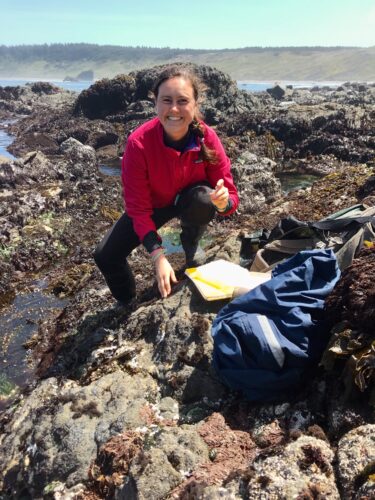Photo courtesy of Emily Boring, communicated by Paul-Alexander Lejas
Although religion and science are frequently portrayed as conflicting forces, Emily Boring (YC ’18, DIV ’23) has proven herself to be a refreshing departure from this paradigm, embodying the intersection between science and faith. Growing up along the Oregon coast, Emily developed a sense of wonder for the ocean that ultimately inspired her studies in Ecology and Evolutionary Biology (E&EB) as an undergraduate at Yale. In line with her childhood dream of working along the boundary of what we do know and what we haven’t proven yet, Boring conducted research in the lab of Thomas Near, a Yale professor and the chair of the E&EB Department. As an undergraduate, she used genomic sequencing to discover a new species of freshwater fish called Percina freemanorum, found in Georgia’s Etowah River System. She also took classes at the nearby Yale Divinity School, where she developed an interest in religious literature and poetry. She now describes these courses as the first time she recognized the ability of language to hold the same sense of wonder, transcendence, and interconnection that she had always experienced in her scientific pursuits. “To me, science and faith were never separate; they were two different vocabularies to express the interconnection of our world,” Boring said.
Upon graduating from Yale in 2018, Boring returned to her home state for further studies in integrative biology. At Oregon State University, she explored the ecology of Leptasterias sp. (a six-rayed sea star) and was inspired by Jane Lubchenco, a professor of marine biology, to think critically about how to communicate scientific information to wider audiences of non-scientists. Although she completed her Master of Science in marine ecology and genetics, she quickly felt called back to religious studies at the Yale Divinity School. “[At YDS], I studied at the Institute of Sacred Music, […] exploring what it means to find a new language of faith that speaks to people, even in this time of a lot of skepticism and distrust of religion,” Boring said. Outside of her coursework, she also worked as a hospital chaplain—a moving experience that, for Boring, epitomized the intersection between science and spirituality. While working with patients in the emergency room and burn intensive care unit, Boring witnessed firsthand how the breakdown of the body—through disease or injury—often pushes people to ask big questions that can be answered by medicine and psychology to a certain extent, but are inherently informed by aspects of spirituality. Since earning her Master of Arts in Religion in 2023, Boring has been ordained as a priest and now serves as an Associate Rector at All Souls Episcopal Parish in Berkeley, California.
Though returning to formal work in the sciences is not beyond the realm of possibility for Boring, for now she keeps busy by preaching and interacting with those in her parish community, while dedicating time to her long-held passion for creative writing. As an undergraduate, writing for the Yale Scientific Magazine’s Scope blog allowed Boring to push the boundaries of traditionally “scientific” publications by incorporating creativity, art, and storytelling. Additionally, she credits Verlyn Klinkenborg, a lecturer at the Yale English Department and School of the Environment, for mentoring her during her journey to become a writer who is curious, attentive to systems in place around her, and confident in her point of view. “That stance of open perception and curiosity, for me, has tied together a lot of what I try to do in my scientific research and also as a person of faith as I’m listening to people and trying to be present to their life moments,” Boring said. Boring is well-versed in the genre of creative nonfiction essays, and has recently discovered that the magazine Christian Century aligns closely with her work. For this particular publication, Boring enjoys pulling from the vocabulary and observations of science to shed light on patterns within our world that produce awe and contribute to spiritual experiences. Currently, she is working on a book project that will include a series of nonfiction essays. By drawing from her experiences as a chaplain, evolutionary biologist, and priest, Boring hopes to elucidate the answers to profound questions surrounding what it means to be a self, what it means to heal, and how we can bear witness to one another in life’s critical moments. Given Boring’s interdisciplinary expertise and personal experiences with illness and recovery, it is sure to be a compelling piece that—just as Boring herself does—lies at the crossroads of science, medicine, and spirituality.

